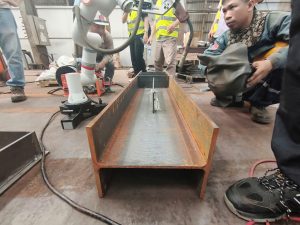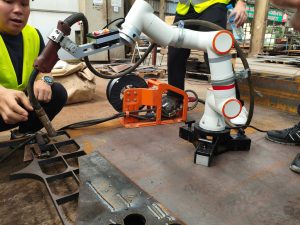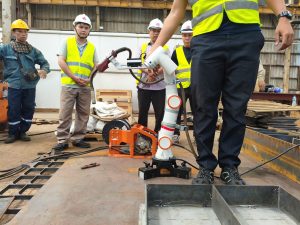I. Quá trình tự động hóa trong công nghiệp nặng
Tự động hóa đã tạo ra cuộc cách mạng trong ngành công nghiệp nặng bằng cách nâng cao hiệu quả, giảm chi phí và cải thiện an toàn. Sự chuyển đổi này được thúc đẩy bởi những tiến bộ trong robot, trí tuệ nhân tạo và hệ thống điều khiển công nghiệp.
1. Sự phát triển của tự động hóa trong công nghiệp nặng
Ban đầu, tự động hóa chỉ giới hạn ở các hệ thống cơ khí được thiết kế để hỗ trợ lao động của con người. Theo thời gian, các công nghệ như bộ điều khiển logic lập trình (PLC) và máy điều khiển số bằng máy tính (CNC) đã xuất hiện, cho phép kiểm soát chính xác hơn các quy trình sản xuất. Ngày nay, tự động hóa tích hợp robot điều khiển bằng trí tuệ nhân tạo (AI) và các hệ thống thông minh hỗ trợ Internet vạn vật (IoT) để vận hành liền mạch.
2. Lợi ích của tự động hóa
Tăng năng suất: Hệ thống tự động hoạt động liên tục không mệt mỏi, giúp tăng sản lượng.
Giảm chi phí: Giảm chi phí nhân công và hạn chế tối đa sai sót trong sản xuất giúp tiết kiệm nguồn lực.
Tăng cường an toàn: Tự động hóa giảm thiểu sự tiếp xúc của con người với môi trường nguy hiểm.
Tính bền vững: Tối ưu hóa việc sử dụng tài nguyên giúp giảm thiểu chất thải và tiêu thụ năng lượng.
3. Thách thức và triển vọng tương lai
Tự động hóa tiếp tục định hình lại ngành công nghiệp nặng, mở đường cho các quy trình sản xuất thông minh hơn, an toàn hơn và hiệu quả hơn.
II. Công ty cổ phần công nghiệp nặng IBS và việc sử dụng robot hàn trong sản xuất
Công ty Cổ phần Công nghiệp nặng IBS là một doanh nghiệp nổi bật trong ngành công nghiệp Việt Nam, chuyên cung cấp các giải pháp sản xuất và kỹ thuật. Trong bối cảnh tự động hóa tiếp tục định hình lại nền sản xuất hiện đại, IBS đã tích hợp robot hàn vào quy trình sản xuất để nâng cao hiệu quả, độ chính xác và an toàn.
1. Vai trò của robot hàn trong sản xuất của IBS
Hàn là một quy trình quan trọng trong công nghiệp nặng, đảm bảo các mối nối chắc chắn và bền bỉ trong các kết cấu kim loại. Theo truyền thống, hàn thủ công gặp phải những thách thức như chất lượng không ổn định, mệt mỏi lao động và rủi ro an toàn. Bằng cách áp dụng hệ thống hàn robot, IBS đã cải thiện đáng kể năng lực sản xuất của mình.
2. Ưu điểm của robot hàn
Độ chính xác và tính nhất quán: Robot thực hiện các mối hàn với độ chính xác cao, giảm thiểu khuyết điểm và đảm bảo chất lượng đồng đều.
Tăng năng suất: Hệ thống hàn tự động hoạt động liên tục, giảm thiểu thời gian ngừng hoạt động và đẩy nhanh chu kỳ sản xuất.
Tăng cường an toàn: Người lao động ít tiếp xúc với khói độc hại và nhiệt độ cao, giảm thiểu tai nạn lao động.
Hiệu quả về chi phí: Mặc dù khoản đầu tư ban đầu khá lớn, nhưng về lâu dài sẽ tiết kiệm được chi phí nhờ giảm thiểu lãng phí vật liệu và chi phí nhân công.
3. Những đổi mới công nghệ tại IBS HI
IBS sử dụng các hệ thống hàn robot tiên tiến, bao gồm robot hàn MIG và TIG, được sử dụng rộng rãi trong các ứng dụng công nghiệp. Các robot này được lập trình để xử lý các nhiệm vụ hàn phức tạp với sự can thiệp tối thiểu của con người, đảm bảo chất lượng sản phẩm cao.
4. Triển vọng tương lai
Khi IBS HI tiếp tục mở rộng, dự kiến sẽ có thêm các khoản đầu tư vào tự động hóa dựa trên trí tuệ nhân tạo và sản xuất thông minh. Việc tích hợp Internet vạn vật công nghiệp (IIoT) và máy học sẽ tối ưu hóa các quy trình hàn, giúp chúng hiệu quả hơn và thích ứng tốt hơn với nhu cầu sản xuất.
Cam kết của IBS đối với tự động hóa phản ánh xu hướng rộng lớn hơn của Công nghiệp 4.0, nơi robot và trí tuệ nhân tạo đang chuyển đổi sản xuất truyền thống thành một hoạt động thông minh và hiệu quả hơn.








